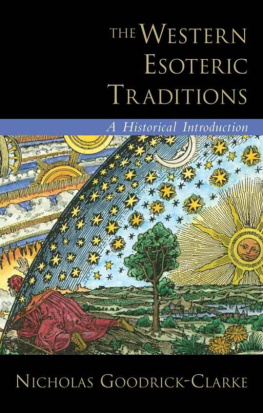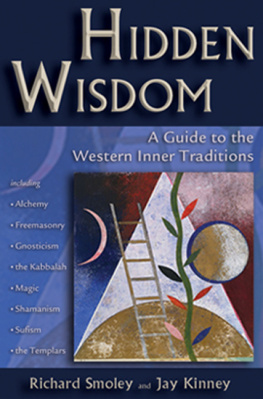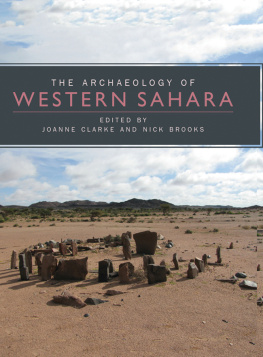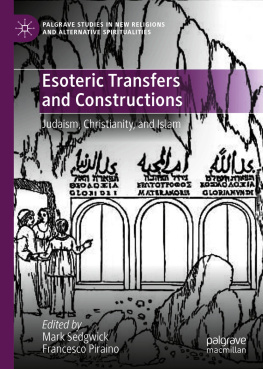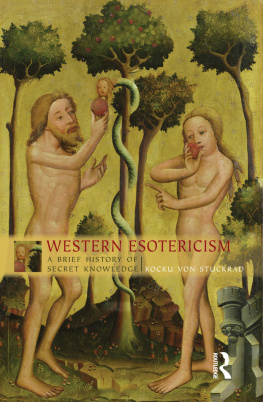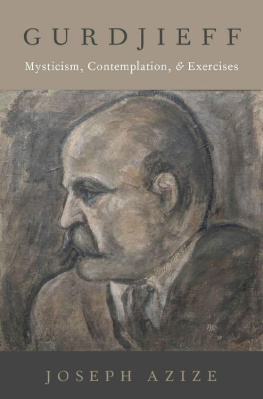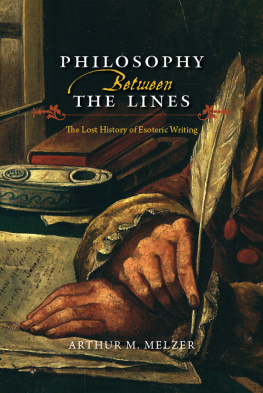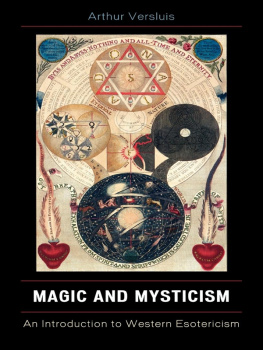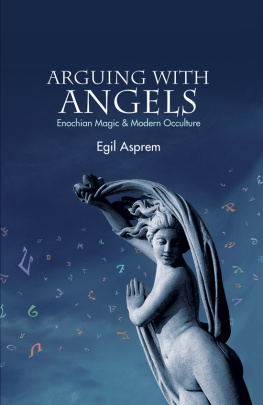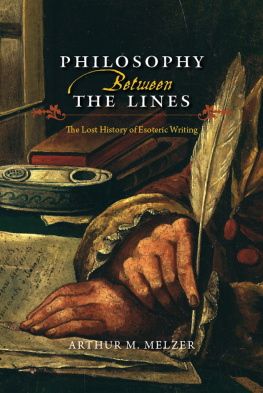The Western Esoteric Traditions
The Western Esoteric Traditions
A Historical Introduction
NICHOLAS GOODRICK-CLARKE


Oxford University Press, Inc., publishes works that further
Oxford Universitys objective of excellence
in research, scholarship, and education.
Oxford New York
Auckland Cape Town Dar es Salaam Hong Kong Karachi
Kuala Lumpur Madrid Melbourne Mexico City Nairobi
New Delhi Shanghai Taipei Toronto
With offices in
Argentina Austria Brazil Chile Czech Republic France Greece
Guatemala Hungary Italy Japan Poland Portugal Singapore
South Korea Switzerland Thailand Turkey Ukraine Vietnam
Copyright 2008 by Nicholas Goodrick-Clarke
All rights reserved.
Nicholas Goodrick-Clarke has asserted his right to be identified as the author of this work.
Published by Oxford University Press, Inc.
198 Madison Avenue, New York, New York 10016
www.oup.com
Oxford is a registered trademark of Oxford University Press
All rights reserved. No part of this publication may be reproduced,
stored in a retrieval system, or transmitted, in any form or by any means,
electronic, mechanical, photocopying, recording, or otherwise,
without the prior permission of Oxford University Press.
Library of Congress Cataloging-in-Publication Data
Goodrick-Clarke, Nicholas.
The western esoteric traditions: a historical introduction/
Nicholas Goodrick-Clarke.
p. cm.
Includes bibliographical references and index.
ISBN 978-0-19-532099-2
1. Occultism. I. Title.
BF1411.G66 2008
135dc22 2008009795
9 8 7 6 5 4 3 2 1
Printed in the United States of America
on acid-free paper
To Clare, who has always shared the journey
Acknowledgments
My introductory history of the Western esoteric traditions is both the digest and fruit of many years work in this fascinating and now rapidly expanding field. While I have worked this terrain since the mid-1970s, I owe a special debt of gratitude to friends and colleagues who have encouraged my interest in new directions. Here I should like to mention Ralph White, director of the New York Open Center, whose international conferences devoted to the Western esoteric traditions at Cesky Krumlov (1995), Prague (1997), Bardsey (1999), Florence (2000), Kutna Hora and Weimar (2006), and Granada (2007) have been an inspiration.
Another dimension in my exploration of the field began in 2000, when I was invited to join the annual June conferences of the Palladian Academy, where I have enjoyed many interesting discussions with participants, including Jean-Pierre Brach, Antoine Faivre, Joscelyn Godwin, Claire Fanger, Deborah Belle Forman, Clare Goodrick-Clarke, Hans Thomas Hakl, Wouter Hanegraaff, Jean-Pierre Laurant, Christopher McIntosh, Marco Pasi, Kocku von Stuckrad, and Arthur Versluis. Their specialist studies and general perspectives on the field have, in their individual ways, been a constant source of intellectual stimulation and spiritual insight.
These same years witnessed the gestation of the Dictionary of Gnosis and Western Esotericism, edited by Wouter Hanegraaff in collaboration with Antoine Faivre, Roelof van den Broek, and Jean-Pierre Brach. Again, their work and that of the many contributors, among whom I was privileged to work, have found its echo in this volume, and I must pay tribute to the indefatigable industry and expertise of the editors.
I should also like to express my gratitude to the trustees of the Blavatsky Trust for the far-sighted encouragement and financial support of the Exeter Centre for the Study of Esotericism (EXESESO), of which I am director, at the University of Exeter since 2005. I am also grateful to Jonathan Barry, head of the School of Humanities and Social Sciences in the University, for encouraging the establishment of EXESESO.
I owe thanks to the librarians at the British Library, the Bodleian Library at Oxford, and the Warburg Institute, University of London, for their helpful and efficient services. I should also like to thank Barry Thompson, librarian of the Theosophical Society in England at London, for advice and publication lending.
Again, I wish to thank my wife, Clare, for conversation, collaboration, and shared interests bearing on our mutual exploration of this field throughout our marriage.
Contents
The Western Esoteric Traditions
Introduction
The Western esoteric traditions have their roots in a religious way of thinking, which reaches back to Gnosticism, Hermeticism, and Neoplatonism in the Hellenistic world during the first centuries A.D. In the Renaissance, the rediscovery of ancient texts led to the scholarly revival of magic, astrology, alchemy, and Kabbalah. Following the Reformation, this spiritual current gave rise to theosophy, Rosicrucianism, and Freemasonry, and the modern occult revival extends from nineteenth-century spiritualism, H. P. Blavatskys Theosophy, and ceremonial magical orders to twentieth-century esotericists such as Rudolf Steiner, Alice A. Bailey, and George Ivanovitch Gurdjieff, and the analytical psychology of Carl Gustav Jung.
The scholarly study of Western esotericism is a comparatively recent phenomenon. There are three dedicated university chairs in the subject at the Sorbonne, Amsterdam, and Exeter, and masters programs in the subject are offered at the latter two universities. Faculty at a growing number of other universities in Europe and the United States offer courses involving Hermetic philosophy, mystical traditions, and the history of esotericism in the medieval, Renaissance, and modern periods. This volume is intended to serve as an introduction to this growing field of study, offering a concise historical survey of its major movements and figures, and a guide to further reading.
What is esotericism? From the Enlightenment until the middle of the last century, magic, astrology, and occultism, to take a few of the subjects now considered under the rubric of esotericism, were generally perceived as survivals of superstition and irrationalism. The intellectual status of such topics was denigrated, and they were kept in epistemological quarantine lest they cause a relapse from progressive rationalism. Just as the established churches had once excluded heterodox doctrine as heresy, the modern post-Enlightenment world rejected magic and occultism as a violation of reason, its dominant criterion of acceptable discourse. These disqualifications are perhaps best illustrated in the sociology of occultism, which still tends to focus on marginality and deviance.
Far from treating esotericism as a rejected form of knowledge, specialist scholars of the subject seek instead to distinguish the intrinsic philosophical and religious characteristics of esoteric spirituality. They are also concerned to document the history of esotericism as a particular form of spirituality that has characterized and illumined Western thought in various schools and movements from late antiquity to the present. Through such a historical approach, it is possible to examine the cultural and social circumstances that favor the emergence of esotericism as a worldview and to document its significant influence on philosophical, scientific, and religious change. In this project, esotericism is restored to a position of historical importance rather than relegated to a casualty of positivist and materialist perspectives during the nineteenth century.
Next page
